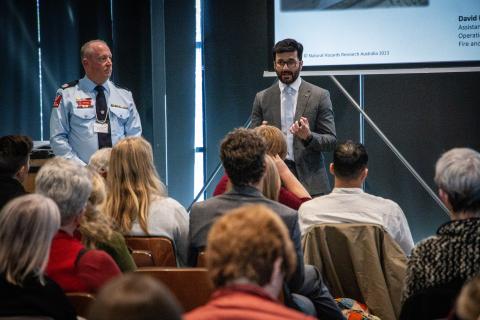
What makes us ready for disaster? Natural Hazards Research Australia (the Centre) postgraduate scholar Syed Adeel Akhtar reflects on his recent engagement with Australia’s disaster management landscape to explore why true readiness starts with emotional intelligence.
In the past three months, I’ve had the privilege of standing in rooms where the future of disaster management in Australia was being debated, imagined and in some cases, quietly transformed.
From Parliament House in Canberra to a bustling innovation conference in Melbourne, to the National Emergency Management Agency (NEMA) Exercise Convergence and a powerful joint presentation in Adelaide, the question that kept surfacing for me was deceptively simple:
What makes us ready?
Is it plans? Doctrine? Technology? The right chain of command?
Of course, all of these matter. But the deeper I went (from the bright lights of a TED-style stage to the engaging conversations in the hallways), the more I came back to the same conclusion:
Readiness is ultimately human.
A Parliament room and a story from Fukushima
In April, at the Centre’s Stakeholder Forum in Canberra, I opened my talk with a story that still gives me goosebumps.
In 2011, as radiation risks rose in Fukushima, most international rescue teams made the difficult decision to withdraw. But Australia’s Urban Search and Rescue team stayed… not because the paperwork demanded it, but because their commander, Rob McNeil, had the clarity, empathy and emotional steadiness to lead through uncertainty.
Three years later, when Japanese Prime Minister Shinzo Abe addressed the Australian Parliament, he invited Rob to be present in the gallery. During his speech, the Prime Minister recalled and narrated what Rob had earlier said during Fukushima response:
“When the Japanese firefighters were grieving, we were able to share their grief. There were no walls of communication between us.”
Then Prime Minister Abe then added:
“We will keep his words in our hearts warmly forever.”
Explaining how emotional intelligence works as a decision-making compass, I ended the talk with the key message… Readiness is ultimately human.
The innovation stage and the Early Career Researcher Competition
In May, I travelled from Canberra to Melbourne to take part in Cooperative Research Australia’s Early Career Researcher Showcase. Picture a theatre filled with some of the country’s most passionate innovators, space technologists, biomedical engineers and sustainability champions.
Standing alongside them, I shared why emotional intelligence isn’t just a ‘soft skill’ but an operational asset for emergency responders. Something that underpins decision-making, builds trust when the stakes are high and keeps teams from fracturing under stress.
Later, at the ’Voices from the Future’ panel, we were asked: What kind of innovation ecosystem do you want to be part of?
My answer was simple: one that puts the human factor at the centre. Because you can have the best technology in the world, but if you can’t build trust, align people and lead through complexity, it doesn’t matter.
A national simulation and the human dimension
From Melbourne, I travelled back to Canberra for the Exercise Convergence, hosted by NEMA. I sat in a room filled with leaders grappling with the realities of compounded disasters, floods, fires, pandemics and critical infrastructure failures.
While frameworks and flowcharts filled the screens, the moment that stuck with me wasn’t about logistics. It was Councillor Steve Krieg’s raw, emotional account of the Lismore floods.
He spoke not as a functionary, but as a human being overwhelmed by grief and responsibility. His voice cracked when he described the heartbreak of trying to lead a devastated community.
It reminded me, again, why this work matters. Because in those moments, no policy or protocol can replace emotional clarity, empathy, and the emotional resilience to lead under pressure.
A shared stage in Adelaide

Finally, in Adelaide, I had the honour of presenting alongside Assistant Commissioner David Lewis AFSM from Fire and Rescue NSW.
David’s reflections from Christchurch and Fukushima powerfully echoed what I’ve been learning. He spoke about navigating decisions where logic, empathy and team cohesion had to work in tandem and how emotional intelligence isn’t the opposite of operational capability. It is operational capability.
To stand beside a leader of his experience and hear him say this research needs to be embedded “into the DNA of our systems” was both humbling and energising.
What makes us ready?
Three months. Four forums. Five events. Dozens of conversations.
The answer I have come to is this:
Readiness isn’t just about plans or checklists. It’s about the human factor. Emotional intelligence is what turns knowledge into action, teams into communities, and pressure into clarity.
This is why I am proud to represent the University of Tasmania, Natural Hazards Research Australia and the Disaster Resilience Research Group as we keep pushing this work forward.
Thank you to all the incredible people I have met along this journey: the Centre team, Cooperative Research Australia, NEMA, Fire and Rescue NSW, Queensland Fire Department, Fire and emergency New Zealand and the many leaders who shared their experiences so generously.
If we want a future workforce that’s fast, adaptive, and deeply human, we need to start by recognising emotional intelligence as mission-critical.
If you were in any of these rooms, I’d love to hear what you think. You can reach out to me at LinkedIn or via email at syedadeel.akhtar@utas.edu.au.
